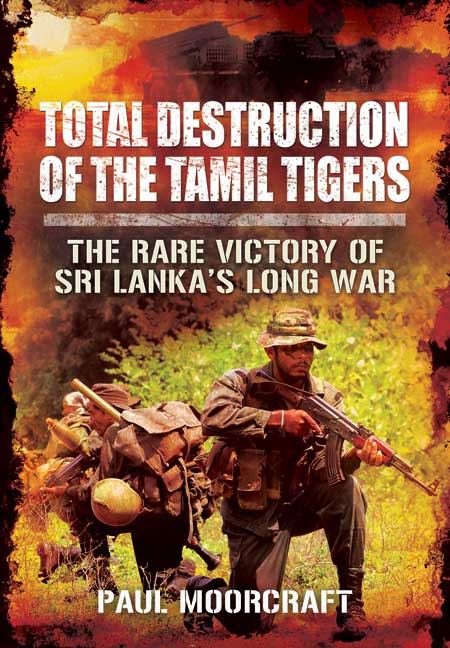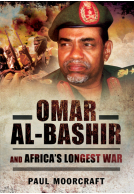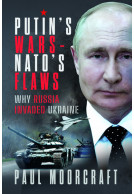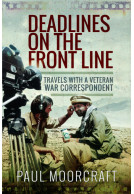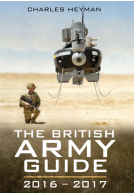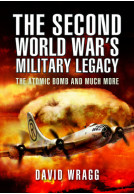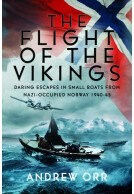Total Destruction of the Tamil Tigers (ePub)
The Rare Victory of Sri Lanka's Long War
Imprint: Pen & Sword Military
File Size: 3.4 MB (.epub)
Pages: 184
Illustrations: 24pp B & W plates
ISBN: 9781783830749
Published: 5th February 2013
In 2009 the Sri Lankan government forces literally eradicated the Tamil Tiger insurgency after 26 years of civil war. This was the first time that a government had defeated an indigenous insurgency by force of arms. It was as if the British army killed thousands of IRA cadres to end the war in Northern Ireland. The story of this war is fascinating in itself, besides the international repercussions for 'terrorism' and insurgency worldwide. Many countries involved themselves in the war – to arm the combatants (China, Pakistan, India, North Korea) or to bring peace (US, France, UK, Norway).
While researching this work Professor Moorcraft was given unprecedented access to Sri Lankan politicians (including the President and his brother, the Defence Permanent Secretary), senior generals, intelligence chiefs, civil servants, UN officials, foreign diplomats and NGOs. He also interviewed the surviving leader of the Tamil Tigers.
His conclusions and findings will be controversial. He reveals how the media and foreign mediators were frustrated by the authorities determined to stamp out Tamil Tiger resistance by whatever means. Their methods, which have led to accusations of war crimes, were brutally effective but are likely to remain highly contentions for years to come.
Student of counterinsurgency campaigns? Add this splendid study to your library. I loved it.
cybermodeler
Rabidly recommended!
A very enlightening book...provides many lessons for the professional military officer and amateur enthusiast alike..excellent book...both engaging and entertaining... I thoroughly enjoyed this book and highly recommend it to those seeking to expand their knowledge of operations in the Far East.
Chris Buckham, Australian Army Journal
A very enlightening book...provides many lessons for the professional military officer and amateur enthusiast alike..excellent book...both engaging and entertaining... I thoroughly enjoyed this book and highly recommend it to those seeking to expand their knowledge of operations in the Far East.
Chris Buckham, Australian Army Journal
Highly readable ...an important contribution to our understanding of the conflict.
David Brewster, Journal of of the Indian Ocean Region
A gripping authoritative and closely researched account.
Forces Pension Society
A remarkable book...The first by a Westerner...presents a fair overall view, in contrast to some local publications [in Sri Lanka].
LMD magazine, Colombo
This work is short but contains a wealth of information and detail... With objective circumspection Moorcraft reports, rarely adding his personal opinion.
Charles Sarvan, Colombo Telegraph
Thought-provoking perspective.
Guy Gabriel, World Peace Foundation
Thorough examination of an important issue.
The Spectator
About Prof Paul Moorcraft
Professor Paul Moorcraft has written over 50 books, both fiction and non-fiction. Besides being a senior instructor at the Royal Military Academy, Sandhurst, and then the Joint Services Command and Staff College, he worked for the UK Ministry of Defence in the Balkans and Middle East. A print and broadcast journalist in 30 war zones, the author worked extensively behind ‘enemy’ lines, most notably with Jihadists during the Soviet occupation of Afghanistan. He has worked with, and reported on, special forces in countries as far apart as Nepal and South Africa, as well as serving as an officer in Zimbabwe’s forces. His command of German, and later Hebrew, supported the initial research for this book. His fluency in Welsh has been useful too as some of the Jewish commandos lived and trained in North Wales and indeed sometimes successfully claimed to be Welsh when captured. The author has also worked in desert war zones, most recently during six trips in Darfur, Sudan, where he spent time with rebel groups and separately with Sudanese government forces
A fellow of the Royal Historical Society, he returned to his Welsh homeland in 2021.







